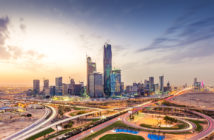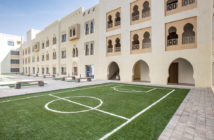Embassy of Indonesia
In 1950, Saudi Arabia and Indonesia established diplomatic relations. How would you define the development of diplomatic ties over the decades of collaboration?
On May 1st, 1950, diplomatic relations between Indonesia and Saudi Arabia officially started with opening the Indonesian Representative in Jeddah. In 1964, the Indonesian government changed the Representative status to the Embassy of the Republic of Indonesia. In 1985, the Indonesian government moved its embassy from Jeddah to Riyadh. At the same time, it was decided to retain the Consulate General in Jeddah, aimed at strengthening economic and socio-cultural ties and cooperation in Jeddah as a commercial hub and economic gateway for Saudi Arabia.
On November 21st, 1947, along with other seven countries of the Arab League, Saudi Arabia was one of the first countries to recognize the independence of Indonesia, proclaimed on August 17th, 1945. Currently, cooperation between the two countries is developing successfully, both at the bilateral level and in international forums, including the United Nations (UN), G20, Organisation of Islamic Cooperation (OIC), Asia-Pacific Economic Cooperation (APEC), and Non-Aligned Movement (NAM).
Formal relationships are also reinforced by people-to-people ties between Saudis and Indonesians, which began much earlier than official diplomacy in 1947. Many Indonesians have visited Mecca and Medina to perform pilgrimages and study Islam. Thus, bilateral ties between the two countries were and continue to be more than just diplomatic relations. This is a brotherly relationship that has long been supported by Islamic solidarity.
In the past few years, the bilateral relationship between Saudi Arabia and Indonesia has reached its golden age considering that King Salman (2017) and Crown Prince Mohammed Bin Salman postponed his planned visit to Indonesia, on February 2019. In turn, the President of the Republic of Indonesia, Joko Widodo, has also made several visits to Saudi Arabia in 2015, 2017, and 2019.
Saudi Arabia is a founding member of the Gulf Cooperation Council (GCC), while Indonesia is the founding member of the Association of Southeast Asian Nations (ASEAN). How do you envision multilateral partnership of these organizations? What accomplishments would you emphasize?
GCC and ASEAN are regional organizations formed for the benefit of each region. Therefore, both organizations may undertake active cooperation in various fields. Indonesia encourages more comprehensive cooperation between ASEAN and GCC, especially in the economic and trade sectors from the ASEAN-GCC FTA, to maximize both parties’ exchange of goods equally needed.
I want to note that ASEAN countries are considered as major producers of natural products such as rice and palm oil. At the same time, the Gulf countries are making great strides in producing the petroleum oil that ASEAN countries need. This can be positively used to ensure the common interests of both countries in the region. Thus, to promote cooperation between the two regions, Saudi Arabia and Indonesia agreed to start cooperation between GCC and Indonesia.
Indonesia encouraged the formation of the Indonesia-GCC Comprehensive Economic Partnership Agreement (CEPA) to help facilitate better outcomes for both economies, especially for Saudi Arabia, as a key economic partner for Indonesia. This will strengthen multilateralism in general.
On the subject of education and Vision 2030. Saudi Arabia has established a free university in Jakarta that educates over 3,500 students annually. How would you evaluate the competence of Indonesian youth as professionals who can contribute to the Saudi Vision 2030?
Indonesia highly appreciates the academic and scientific cooperation with Saudi Arabia lasting more than 40 years. The cooperation has contributed to the improvement of youth education in Indonesia.
The Arabic language, the history of Saudi Arabia, and Islam are taught to Indonesian youth, especially in the various traditional Islamic boarding schools spread across the country. In addition, through its cultural diplomacy, the Saudi government has inspired those seeking to improve their academic understanding of the Arabic language and Islamic culture.
The education of Indonesian youth in an institution associated with Saudi Arabia will certainly contribute to a better understanding of the dynamics of the Kingdom. In turn, this will foster a closer and more intelligent relationship between the two countries, especially when Saudi society is undergoing a major transformation as part of Vision 2030.
According to the United Nations Conference on Trade and Development (2017), Indonesia was among the five most promising investment countries. What are the essential factors, potential risks, and possible rewards for the Saudi entrepreneurs to invest in Indonesia?
In 2019, Saudi Arabia’s total investment in Indonesia was $5.4 million, slightly better than $5.36 million in 2018. However, this figure is still below the expected $6 billion.
During President Joko Widodo’s administration, infrastructure projects were pushed across Indonesia to evenly distribute wealth and development in the most remote regions of the country. The Sovereign Wealth Fund (SWF) was created to externally manage investments and support infrastructure projects. To this end, invitations were sent to several countries in the Middle East, including Saudi Arabia, to participate in financing Indonesia’s ever-growing infrastructure projects. As a result, several Saudi investments have been made in projects in Aceh and East Kalimantan.
Indonesia’s Shariah financial and banking sector has also experienced noticeable development. This has created ample opportunity for Saudi Arabia to invest in Bank Syariah Indonesia, a state-owned banking facility specifically dedicated to Sharia-compliant banking. While progress is possible, much remains to be done. Indonesia has been able to improve its business infrastructure and good business practices to provide better opportunities to increase foreign investment from Saudi investment companies.
In recent years, tourism in Indonesia has been thriving, accounting for 4.1% of total GDP for the year 2017. What makes Indonesia an attractive destination specifically for Saudi tourists?
Indonesia has granted Saudi citizens a visa on arrival opportunity, and up to 33,800 Saudis travel to Indonesia every year. Of course, it will be possible to increase tourist activity in the future. Indonesia is becoming an increasingly popular destination for honeymooners from the Middle East, including the Saudis, with Bali as a favorite destination.
Indonesia is currently developing five new must-visit tourism destinations, namely the picturesque Lake Toba in North Sumatra province, Borobudur, the largest Buddhist temple in the world located in Central Java province, Mandalika Resort in West Nusa Tenggara province, Labuan Bajo with Komodo National Park in East Nusa Tenggara province, and Likupang in North Sulawesi province with its magnificent beaches and underwater park. These destinations have been developed along with the numerous amenities that can serve and cater tourists from Saudi Arabia.
For this reason, the Indonesian embassy, in cooperation with the Ministry of Tourism, regularly hosts tourism exhibitions in Saudi Arabia and invites Saudi YouTubers and influencers to visit Indonesia. As a result, their subscribers will see posts and videos, and it is hoped that more Saudi tourists of different ages will be able to visit Indonesia.
The opportunity for benefiting from tourism sector may also be mutual to both side Due to a large number of Indonesian pilgrims, Saudi authorities may also create a religious tourism package for Indonesian pilgrims to extend their stay in Saudi Arabia.
The Indonesian embassy is located in the Diplomatic Quarter, a unique example of multicultural cooperation and trust in diplomacy. What would be your thoughts on the concept of DQ? How does the location contribute to multilateral collaboration?
The DQ was designed not only to accommodate foreign embassies and the Saudi-based regional and international organizations but also as a cosmopolitan center offering the best quality of life and a unique destination for intercultural dialogue. It is definitely felt by the people living in the area.
The neighborhood of the DQ has unique cultural landmarks such as the Cultural Palace and other venues for holding conferences, forums, and exhibitions, which we often used for our cultural programs, especially before the pandemic.The variety of parks and gardens, great public services in the area, and close distance to the central area of Riyadh certainly make the DQ one of the best areas to live in Saudi.
What is the daily routine of the Ambassador of Indonesia in the DQ? Any favorite places?
I usually start my day with physical exercise before going to work. Sometimes when the weather permits, I often do my exercise in one of the many great parks around the area.
On weekends or holidays, I spend time socializing with other Indonesian expatriates. Before the COVID-19 pandemic, these interactions usually took place in one of the beautiful scenic parks in DQ. Now, as the Health Protocol prescribes, these interactions have been limited to virtual meetings. Nevertheless, I hope to communicate directly with my fellow Indonesians soon, as the embassy has been and continues to be their home abroad in the Kingdom.
Embassy of Indonesia
Amr Aldamri St, Al Safarat, Riyadh 12512
Contact No: 0011 488 2800
Website: https://kemlu.go.id/riyadh/id
Twitter: @riyadh_kbri




